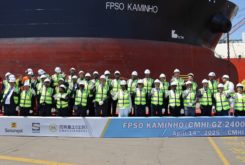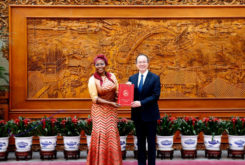The oil executive appointed to keep Angola as an oil power
With the economy officially in recession, the new Angolan government made it its main priority, in the first year in office, to reform the oil sector, the country´s growth engine.
Against a backdrop of falling oil production, volatile oil prices and the national oil company´s high, Carlos Saturnino has become the face of the country´s effort to keep Angola attractive for energy multinationals.
A trained economist, Saturnino rose steadily inside Sonangol, until becoming the national oil company´s CEO in the fall of 2017.
According to local business sources, he is close to former Sonangol CEOManuel Vicente, who was the country´s vice-president until the last elections. )sable dos SantosSaturnino´s rise is the product of the confidence Vicente gave him over the years, as the oil company´s executive.
In fact, Vicente´sinterventionis considered to have been decisive for João LourençotoappointSaturninoas Isabel dos Santos´successor, at a time other names were under consideration.
It was by the hand of Isabel dos Santos that Saturnino ascended to the board of directors of the oil company – a position he accumulated with that of president of Sonangol Pesquisa e Produção.
But it was also because of disagreements with the former CEOthat he ended up being removed from office at the end of 2016 – a decision he protested in a publicly disclosede-mail he addressed internally, questioning the decision of the CEOand daughter of former president José Eduardo dos Santos.
Since then, relations between both were sour, and they became even worse after Saturnino, in one of his first public interventions, strongly criticized his predecessor, for the poor relations Isabel dos Santos kept with international oil majors, that led to lack of investment in exploration – crucial for oil reserves replenishment – and the company´s high debt level.
He later went further in accusing Isabel dos Santos of transferring the oil company´s funds to her own consultancies, and even ordering such operations after a new board had been nominated. Saturnino even announced he would be sending a detailed account of these events to the public prosecutor´s office, where an investigation has been pending.
The contrast between the former and current Sonangol CEOs is one of personalities – the new CEO being a more discrete individual, with an extensive network in oil multinationals. Saturnino profile show him as a very talented professional with a deep knowledge of the oil company, where he worked almost all of his professional life,and the worlds energy industrysector
These differences have come to the fore in terms of management styles, with Saturnino relying mostly on Sonangol cadres, and less on consultancies.
Isabel dos Santos relied on international businessmanagers and consultants(McKinsey)in her business, mainly of Portuguese origin– her right-handman has been Mário Leite Silva – as well as in Portuguese law firms (PLMJ, Vieira de Almeida and Associados), and herbusiness partners were often Portuguese like Américo Amorim at Galp Energia and Paulo Azevedo at NOS.
In contrast,Carlos Saturninohas deep links to French companies, namely oil major Total.
Sonangol´s new CEO is known to be enthusiastic about economic relations with Paris, andis the former president of the Franco-Angolan Chamber of Commerce, which allowed him access to the leaders of the French business community in Luanda.
He graduated in 1985 in Economics, University of Paris XIII (Paris NORD), to which he remained connected. From there he went on to a career at Sonangol, where he has been working for more than three decades.
Saturnino´svast circle of relations in France extends far beyond the oil industry, and is said to include Daniel Sigaud, an aviation executivewho has been positioning to take a leading position in theAngolanaviation business.
In the last few years of Isabel dos Santos´ leadership at Sonangol, when the preponderance of Portuguese consultants and other nationalities in the day-to-day running of the oil company was causing irritation among senior nationalstaff, Saturninowas critical of the option forconsultants.
One of his past major causes has been the promotion of Angolan cadres in the oil sector, known as “Angolanization”.
Particularly pleased with his appointmentwas Total, whose CEO, Patrick Pouyanné, had knownSaturninofor a long time.
Saturnino has been responsible for relations between Sonangol and Total since the late 1990s, and Pouyannéwas the general secretary of the former Angolan subsidiary of the French group (then ELF).
The french executive has made frequent recent visits to Luanda in his new capacity.
Total’s greater confidence in Angola after the appointment of Saturninocorresponded to the entry into the fuel distribution business, which it leadsin the African continent, along with a reinforcement in production and exploration projects, such as the acceleration of the development of the “Kaombo” project (Block 32) and the launch of “Zinia 2″ (which will increase production in Block 17, “the crown jewel” of Total´sassets in Angola), as well as an agreement to operate Block 48.
In the sector´s reform, the backdrop has been of Government concessions to long-time demands of the international oil companies,namely in taxation,to stimulate productive investments.
Particularly beneficial has also been the start of payment to oil companies of outstanding “cash calls” (currently at c. USD 1.5 billion).
For Saturnino, as well as for oil minister Diamantino Azevedo, and indeed for president João Lourenço, the biggest challenge in the oil industry is to prevent a predicted oil production decline in the coming years.
With no new discoveries in the last few years, and major oil wells entering a maturity or decline fase, the country needs new wells to come on stream urgently.
Production, according to OPEC data, is currently at the 1.4-1.5 million barrels per day interval, well bellow the levels of 1.8 reached in 2015, and oil consultancies predict the fall to continue, despite ongoing efforts.
This comes as the country struggles to balance its budget, highly reliant on oil revenues, and attempts to diversify its economy.
Part of thestrategic plan to attract new playersto theoil and gas sectorincludes promoting a licensing round in 2019 and opening up marginal fields,based on new 2018 legislation, which are expected to draw the attention of medium-sized oil companies.
In line with Angola’s decision to promote access to marginal fields, the government has established guidelines for marginal operators by Presidential decree.
According to the law, marginal fields are characterized by recoverable resources of less than 300 million barrels; water depth exceeding 800 meters; and/or income to the state less than USD 10.5 per barrel. The law also provides different tax structures for marginal fields.
The 2019 licensing round, which will include onshore and offshore blocks in the Congo, Namibe and Cunene basins, is expected to boost exploration potential, or at least to prevent the current decline trend.
While concessions by Angola to oil majors have been ample, a key factor for the success of the strategy set out by the new CEO of Sonangol and the oil minister cant´t be controlled by none of them: a rise in Brent oil prices, which have fallen steeply, from USD 80 to USD 60 in the last few months, making investments less attractive.



